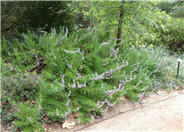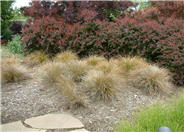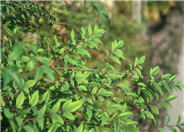
Common name:Gray Lavender Cotton
Botanical name:Santolina chamaecyparissus
This ground cover/small shrub will grow to 3' tall and has small, grayish silver leaves with yellow flowers that bloom in the summer.

Common name:Early Sunrise Coreopsis
Botanical name:Coreopsis grandiflora 'Early Sunrise'
The 'Early Sunrise' is a wonderful cultivar and showy, southern U.S. native. Golden yellow, double flowers on 18" tall bushy plants bloom from June to September in full sun and average to dry soils. It's a bit shorter than other cultivars. It makes for good cut flowers, and pruning keeps the plants abundant with blooms. -Holland WIldflower Farm

Common name:Whirling Butterflies Gaura
Botanical name:Gaura lindheimeri 'Whirling Butterflies'
'Whirling Butterflies" is a profusely flowering perennial that grows 3' high. It has pink buds that open to showy white flowers (larger than other cultivars) in spring and summer. It needs full sun in most areas but afternoon shade in desert areas. It needs regular watering. This is a great plant for cut flowers and flower borders.

Common name:Powis Castle Artemisia
Botanical name:Artemisia 'Powis Castle'
This mounding shrub reaches 3 ft. high and up to 5ft. wide with fine silver foliage. It does well in coastal areas as well as inland warm areas. It rarely blooms but is used for its beautiful foliage. It is striking next to perennials with bright colors. This shrub prefers full sun and well draining soil. It is drought tolerant once it's established.

Common name:Woolly Blue Curls
Botanical name:Trichostema lanatum
The Woolly Blue Curls is an evergreen shrub that reaches 3'-5' high. It has an open branching habit and has long stalks of brilliant purple woolly flowers in the spring and summer. This shrub is native to California, is drought tolerant, and attracts hummingbirds. -Cornflower Farms

Common name:Curly Top Sedge
Botanical name:Carex buchananii
This orange-bronze ornamental grass/reed is 2-3' tall and 1-2' wide and does best in full sun to part shade. It needs moist soil so plant near a water feature or pond.

Common name:Chinese Wisteria
Botanical name:Wisteria sinensis
While the sinensis is similar to the floribunda, it bears more rounded, full clusters of strongly fragrant flowers which open more or less all at once. There are usually 13-15 leaflets per leaf, and they require full sun and average to little watering. It comes in many colors such as blues, whites and purples.-Monterey Bay Nursery

Common name:Nandina, Heavenly Bamboo
Botanical name:Nandina domestica
Nandina domestica is a graceful upright shrub that grows from 3'-6' in height. It gets its name from its bamboo-like growth habit. When thinned from the center it bears a remarkable resemblance to bamboo. It is best used in groups. It can be used in a shaded patio or out in a shrub border with full sun. An interesting feature of Heavenly Bamboo is the bronze color in the new growth when planted in full sun. It also bears clusters of white flowers in the spring.

Common name:Mexican Bush Sage, Mexican Sage
Botanical name:Salvia leucantha
The Mexican Sage is a bushy shrub that grows 3'-4' tall and wide. It has hairy white stems, grey-green leaves and velvet-like purple flower spikes that bloom summer through fall. This shrub tolerates sun, light shade, little water, and is hardy to 15 degrees F. The Mexican Sage attracts hummingbirds. Be careful not to overwater. -Cornflower Farms
Designer: Terri Nichols
Photographer: GardenSoft
Practice grass-cycling by leaving short grass clippings on lawns after mowing, so that nutrients and organic matter are returned to the soil.
Adjust sprinklers to avoid watering sidewalks and driveways.
Attract, or buy beneficial insects such as ladybugs and lacewings to control pest outbreaks in your garden.